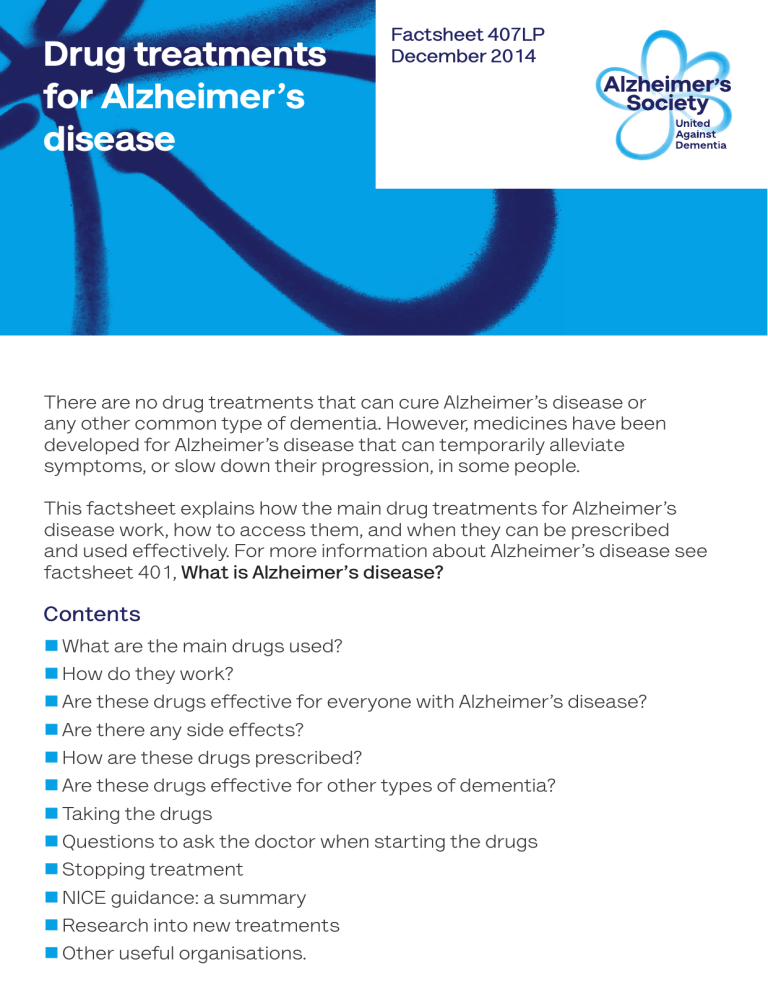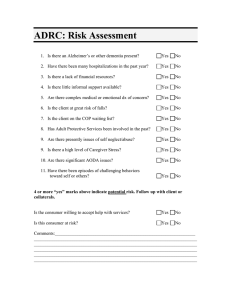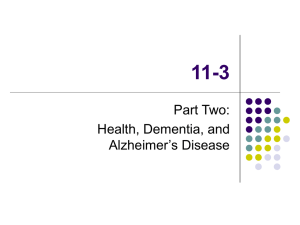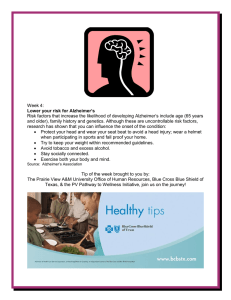
Drug treatments for Alzheimer’s disease Factsheet 407LP December 2014 There are no drug treatments that can cure Alzheimer’s disease or any other common type of dementia. However, medicines have been developed for Alzheimer’s disease that can temporarily alleviate symptoms, or slow down their progression, in some people. This factsheet explains how the main drug treatments for Alzheimer’s disease work, how to access them, and when they can be prescribed and used effectively. For more information about Alzheimer’s disease see factsheet 401, What is Alzheimer’s disease? Contents nnWhat are the main drugs used? nnHow do they work? nnAre these drugs effective for everyone with Alzheimer’s disease? nnAre there any side effects? nnHow are these drugs prescribed? nnAre these drugs effective for other types of dementia? nnTaking the drugs nnQuestions to ask the doctor when starting the drugs nnStopping treatment nnNICE guidance: a summary nnResearch into new treatments nnOther useful organisations. 2 Drug treatments for Alzheimer’s disease Drug treatments for Alzheimer’s disease Drug treatment for Alzheimer’s disease is important, but the benefits are small, and drugs should only be one part of a person’s overall care. Nondrug treatments, activities and support are just as important in helping someone to live well with Alzheimer’s disease. Many drugs have at least two names. The generic name identifies the substance. The brand name varies depending on the company that manufactures it. For example, a familiar painkiller has the generic name paracetamol and is manufactured under brand names such as Panadol and Calpol, among others. Occasionally, a drug with a very well-known generic name (such as paracetamol) will also be manufactured and sold using just this name. What are the main drugs used? There are two types of medication used to treat Alzheimer’s disease: acetylcholinesterase inhibitors (often shortened to just ‘cholinesterase inhibitors’) and NMDA receptor antagonists. The two types work in different ways. These are explained below. nnThe generic names for the cholinesterase inhibitors are donepezil, rivastigmine and galantamine: nnDonepezil was originally patented as the brand name Aricept, but is more widely available now as just generic donepezil. nnRivastigmine was patented as Exelon and is now also available as other brands, as well as generic rivastigmine. nnGalantamine was patented as Reminyl and is now also available as generic galantamine and the brands Reminyl XL, Acumor XL, Galsya XL and Gatalin XL. nnThe NMDA receptor antagonist is memantine. It was originally patented as Ebixa and is now also available as generic memantine. Other UK brand names for memantine include Maruxa and Nemdatine. 3 Drug treatments for Alzheimer’s disease How do they work? Cholinesterase inhibitors (donepezil, rivastigmine and galantamine) In the brain of a person with Alzheimer’s disease, there are lower levels of a chemical called acetylcholine. Acetylcholine helps to send messages between certain nerve cells. In Alzheimer’s there is also a loss of the nerve cells that use acetylcholine. Falling acetylcholine levels and progressive loss of these nerve cells are linked to worsening symptoms. Donepezil, rivastigmine and galantamine all prevent an enzyme called acetylcholinesterase from breaking down acetylcholine in the brain. As a result, an increased concentration of acetylcholine leads to increased communication between nerve cells. This may temporarily alleviate or stabilise some symptoms of Alzheimer’s disease. All three cholinesterase inhibitors work in a similar way, but one might suit a certain individual better than another, particularly in terms of side effects experienced. Guidance on the use of drugs in the NHS is issued by the National Institute for Health and Care Excellence (NICE). NICE reviews drugs and decides whether they represent good enough value for money to be available as part of NHS treatment. Drugs considered by NICE will also have been through the UK or European licensing process for new medicines. This means the medicine has been tested and met rigorous standards of safety, quality and effectiveness. The licence will be granted for treatment of a particular health condition. For the cholinesterase inhibitors, the NICE guidance (2011) suggests that the cheapest drug (currently donepezil) should generally be tried first. See ‘NICE guidance: a summary’. Memantine The action of memantine is different from that of donepezil, rivastigmine and galantamine. Glutamate is another chemical that helps to send messages between nerve cells. Glutamate is released in excessive amounts when brain cells are damaged by Alzheimer’s disease. This causes the brain cells to be damaged further. Memantine protects brain cells by blocking the effects of excess glutamate. 4 Drug treatments for Alzheimer’s disease Are these drugs effective for everyone with Alzheimer’s disease? Donepezil, rivastigmine and galantamine The guidance from NICE (2011) recommends that donepezil, rivastigmine or galantamine is offered as part of NHS care for people with mild-tomoderate Alzheimer’s disease. There is good evidence (strongest for donepezil) that these cholinesterase inhibitors also help people with more severe Alzheimer’s disease (see ‘Stopping treatment’). Between 40 and 70 per cent of people with Alzheimer’s disease benefit from taking a cholinesterase inhibitor. In cases where the treatment shows benefit, symptoms improve temporarily (for between six and 12 months in most cases) and then gradually worsen over the following months. People taking a cholinesterase inhibitor can experience: reduced anxiety; improvements in motivation, memory and concentration; and improved ability to continue daily activities (eg personal care, shopping, dressing). It is not clear whether the cholinesterase inhibitors also bring benefits for behavioural changes such as agitation or aggression. Trials in this area have given mixed results. Memantine The NICE guidance (2011) recommends use of memantine as part of NHS care for severe Alzheimer’s disease (see ‘NICE guidance: a summary’). NICE also recommends memantine for people with moderate Alzheimer’s disease who cannot take the cholinesterase inhibitor drugs (this is usually because of side effects). Memantine is licensed for the treatment of moderate-to-severe Alzheimer’s disease. In people in the middle and later stages of the disease, it can slow down the progression of symptoms, including disorientation and difficulties carrying out daily activities. There is some evidence that memantine may also help with symptoms such as delusions, aggression and agitation. For more information see factsheet 408, Drugs for behavioural and psychological symptoms in dementia, and factsheet 509, Dementia and aggressive behaviour. 5 Drug treatments for Alzheimer’s disease Are there any side effects? Generally, cholinesterase inhibitors and memantine can be taken without too many side effects. Not everyone experiences the same side effects, or has them for the same length of time (if they have them at all). The most frequent side effects of donepezil, rivastigmine and galantamine are loss of appetite, nausea, vomiting and diarrhoea. Other side effects include muscle cramps, headaches, dizziness, fatigue and insomnia. Side effects can be less likely for people who start treatment by taking the lower prescribed dose for at least a month (see ‘Taking the drugs’). The side effects of memantine are less common and less severe than for the cholinesterase inhibitors. They include dizziness, headaches, tiredness, raised blood pressure and constipation. It is important to discuss any side effects with the doctor and/or the pharmacist. None of these drugs are addictive. How are these drugs prescribed? NICE guidance (2011) states that, in the first instance, these drugs can only be prescribed by a specialist in dementia care. This will often be a consultant old-age psychiatrist, geriatrician or neurologist. A GP will generally refer a person with suspected dementia to a memory service for a specialist assessment. A consultant-led team at the clinic will carry out a series of tests to determine whether the person has dementia and, if so, which type. For more about the diagnosis of dementia see factsheet 426, Assessment and diagnosis. If the diagnosis is Alzheimer’s disease, the consultant will offer the drugs and write the first prescription. (In some parts of the country arrangements allow for the consultant to write to the GP to ask them to start prescribing.) Once the person has started on the drugs and is stable at the optimum dose (see ‘Taking the drugs’), the specialist will 6 Drug treatments for Alzheimer’s disease usually ask the GP to take over routine prescribing. The person will then generally have regular reviews of how well their medication is working, either with a specialist at the memory clinic or with the GP. (This divided responsibility between the consultant and GP is sometimes called shared care prescribing.) Generally, cholinesterase inhibitors and memantine can be taken without too many side effects. Not everyone experiences the same side effects, or has them for the same length of time (if they have them at all). Are these drugs effective for other types of dementia? The cholinesterase inhibitors were developed specifically to treat Alzheimer’s disease. There has been relatively little research into whether they (or memantine) are helpful for people with other types of dementia. There is evidence that the cholinesterase inhibitors are effective in people with dementia with Lewy bodies, and dementia due to Parkinson’s disease. Rivastigmine is licensed for Parkinson’s disease dementia. Acetylcholine levels are often even lower in people with dementia with Lewy bodies than in those with Alzheimer’s disease. NICE guidelines recommend that a cholinesterase inhibitor is offered to a person with dementia with Lewy bodies or Parkinson’s disease dementia if they have distressing symptoms (eg hallucinations) or challenging behaviours (eg agitation, aggression). For more information, see factsheet 403, What is dementia with Lewy bodies (DLB)? and factsheet 442, Rarer causes of dementia. For memantine, one trial showed benefits for people with dementia with Lewy bodies and Parkinson’s disease dementia, but there is not enough evidence to draw any firm conclusions. Several trials have looked at the treatment of vascular dementia with a cholinesterase inhibitor or memantine. The benefits for either are very small (if any), and seen mainly for mental abilities of people with a combination of both Alzheimer’s disease and vascular dementia (known as mixed dementia). NICE guidelines recommend cholinesterase inhibitors for treatment of mixed dementia when Alzheimer’s is the main cause, but 7 Drug treatments for Alzheimer’s disease not for the treatment of pure vascular dementia. For more information see factsheet 402, What is vascular dementia? From the few trials carried out, there is no good evidence that the cholinesterase inhibitors or memantine are of benefit for people with frontotemporal dementia, including Pick’s disease. In some people they may make symptoms worse. These drugs are not licensed for frontotemporal dementia and will not generally be prescribed for it. For more information see factsheet 404, What is frontotemporal dementia (FTD)? Taking the drugs NICE guidelines (2011) say the specialist should seek the views of the carer on the condition of the person with dementia, before treatment and during follow-up appointments. They should also seek the views of the person with dementia. The person should take the drugs as prescribed and the doctor should try to ensure this is done. The person may benefit from using a pill box with different compartments for each day of the week, containing the prescribed dose. The pharmacist may be able to supply drugs pre-packed like this. If the person misses a dose of any of these drugs, they should take it as soon as they remember, as long as it is on the same day. If it is the next day, the person should not take two tablets, but should simply continue with their normal dose. Doses vary. Usually a person with Alzheimer’s disease will start on a low dose, which will be increased later to make the treatment more effective. Some people may not be able to take the highest dose because of side effects. The doctor will prescribe the best dose for each individual. Information about doses is given below. nnDonepezil is available in 5mg or 10mg tablets. It is taken once a day, usually at bedtime. Treatment is started at 5mg a day and then increased to 10mg a day after one month if necessary. The maximum licensed total daily dose is 10mg. 8 Drug treatments for Alzheimer’s disease nnRivastigmine comes in capsules or a solution to drink. It is taken twice a day, with morning and evening meals. People start with 3mg a day in two divided doses, which will usually increase (at intervals of at least two weeks) to between 6mg and 12mg a day. The maximum licensed total daily dose for oral rivastigmine is 12mg. Rivastigmine patches are also available. These deliver daily doses of 4.6mg, 9.5mg or 13mg, with fewer side effects than the capsules. Patches are suited to people who struggle with taking medication by mouth; they are popular with carers. Only one patch should be applied at any one time and it should be put on different parts of the skin each time, to avoid the person getting a rash. nnThe recommended starting dose for galantamine is 8mg each day for four weeks, increasing to 16mg a day for another four weeks, and then kept at a dose of between 16 and 24mg daily. Galantamine is made in a variety of forms including a 4mg/ml (twice-daily) oral solution, and tablets of 8mg and 12mg. Slow-release (XL) capsules are available in doses of 8mg, 16mg and 24mg. These are popular because they only need to be taken once a day. The maximum licensed total daily dose for galantamine is 24mg. nnMemantine comes in two forms: as 10mg and 20mg tablets, and as 10mg oral drops. The 10mg tablets can be broken in half (into 5mg doses) and taken with or without food. The recommended starting dose is 5mg a day, increasing every week by 5mg, up to 20mg a day after four weeks. The maximum licensed total daily dose for memantine is 20mg. nnIt is important that the person takes the doses that have been prescribed. If the person misses a dose of any of these drugs, they should take it as soon as they remember, as long as it is on the same day. If it is the next day, the person should not take two tablets, but should simply continue with their normal dose. 9 Drug treatments for Alzheimer’s disease Questions to ask the doctor when starting the drugs It is important that someone who has been prescribed one of these drugs understands what it does and how to take it. The following are things that they may wish to ask the doctor about. It can help for the person with dementia or their carer to write down these questions, and any answers the doctor gives. nnWhy have I been prescribed this drug specifically? nnWhat are the potential benefits of taking this drug? nnHow long will it be before I see a result? nnIf I get side effects, should I stop taking the drug immediately? nnWhat will happen if I stop taking the drug suddenly? nnCan I drink alcohol while taking the drug? nnHow might this drug affect other medical conditions? nnWhat changes in health should I report immediately? nnHow often will I need to visit the clinic or surgery? nnIf this drug doesn’t suit me, can I try another drug? Stopping treatment Medication should be reviewed regularly, and continued for as long as the benefits outweigh any side effects. If the person with Alzheimer’s decides to stop taking a drug, they should speak to the doctor first if possible, or as soon as they can after stopping treatment. Treatment may also be stopped by agreement with the doctor if the person becomes unable to take the medicines in the prescribed way, even with support. If someone stops taking their prescribed drug, their condition may get worse more quickly. If someone has stopped and thinks they should restart their medication, it is important that they contact their doctor as soon as possible. For someone who is taking a cholinesterase inhibitor, a decision will need to be made when their Alzheimer’s disease becomes severe. There is now 10Drug treatments for Alzheimer’s disease good evidence that cholinesterase inhibitors continue to bring benefits even when someone’s Alzheimer’s is severe. Many doctors therefore continue to prescribe a cholinesterase inhibitor for severe Alzheimer’s until the above criteria for stopping treatment are met, if ever. The issue of whether to add memantine to the cholinesterase inhibitor for someone with severe Alzheimer’s disease (known as combination treatment) is less clear cut. The two drugs work in different ways and there is research evidence that, for someone who is already on donepezil, adding memantine might bring additional benefit. However, NICE guidance (2011) does not recommend combination treatment. NICE guidance: a summary In 2011, NICE issued revised guidance recommending that people with Alzheimer’s disease (or mixed dementia in which Alzheimer’s is the main cause) should have increased access to the available drugs. The current NICE guidance on drug treatments for Alzheimer’s disease recommends that people in the mild-to-moderate stages of the disease should be given treatment with donepezil, galantamine or rivastigmine, including individuals with both Alzheimer’s disease and learning disabilities. The NICE guidance (2011) further recommends that memantine should be prescribed as part of NHS care for people with severe Alzheimer’s disease, or for those with moderate disease who cannot take the cholinesterase inhibitor drugs. NICE also says that, when considering drug treatment, how severe someone’s dementia has become should not be measured by scores on mental ability tests (for example, the Mini Mental State Examination (MMSE)) alone, but by a broader view of the person’s condition. This is to avoid an arbitrary decision to stop drug treatment, such as when the person’s MMSE score has crossed a threshold from moderate to severe or because they have gone into a care home. NICE guidelines allow people with dementia with Lewy bodies or Parkinson’s disease dementia to be offered a cholinesterase inhibitor if 11Drug treatments for Alzheimer’s disease their non-cognitive symptoms (eg hallucinations, agitation) are causing distress or leading to challenging behaviour. The consultant will decide whether these treatments are appropriate for a particular individual. In relation to the Alzheimer’s disease drugs, NICE makes the following recommendations: nnTreatment is started by a doctor who specialises in the care of people with dementia. nnPeople who are started on one of the drugs are checked regularly, usually by a specialist team unless shared care arrangements with primary care are in place. nnThe check-up includes an assessment of the person’s mental abilities, behaviour and ability to cope with daily life. nnThe views of the carer on the person’s condition are discussed at the start of drug treatment and at check-ups. nnTreatment is continued as long as it is judged to be having a worthwhile effect. nnWhere a cholinesterase inhibitor is given, the least expensive of the three drugs (currently donepezil) is prescribed first. However, if donepezil is not suitable for the person, another cholinesterase inhibitor could be chosen. Research into new treatments No new drugs have been licensed in the UK for Alzheimer’s disease since memantine in 2002. However, there is a lot of research into new drug treatments. These aim either to give better relief from symptoms or – if possible – to slow down or stop the underlying disease in the brain. More information about taking part in research is available from memory services or the Join Dementia Research website (see ‘Other useful organisations’). 12Drug treatments for Alzheimer’s disease Other useful organisations Join Dementia Research 0300 222 1122 comms.jdr@nihr.ac.uk joindementiaresearch.nihr.ac.uk A national service that enables people to register their interest in NHS dementia research and be matched with potentially suitable research studies. National Institute for Health and Care Excellence (NICE) 10 Spring Gardens London SW1A 2BU 0300 323 0140 nice@nice.org.uk nice.org.uk Provides national evidence-based guidance and advice for health, public health and social care practitioners. Accessible versions of NICE guidance are produced for the public. Factsheet 407LP Last reviewed: December 2014 Next review due: December 2017 Reviewed by: Dr Rupert McShane, Consultant in Old Age Psychiatry, Oxford Health NHS FT, Delia Bishara, Consultant Pharmacist in Mental Health of Older Adults and Dementia, South London and Maudsley NHS FT, Prof Roy Jones, Director and Honorary Consultant Geriatrician, The Research Institute for the Care of Older People, Royal United Hospital, Bath, and Dr Jill Mann, Memory Clinic Physician, Royal United Hospital, Bath This factsheet has also been reviewed by people affected by dementia. A list of sources is available on request. Alzheimer’s Society National Dementia Helpline England, Wales and Northern Ireland: 0300 222 1122 9am–8pm Monday–Wednesday 9am–5pm Thursday–Friday 10am–4pm Saturday–Sunday This publication contains information and general advice. It should not be used as a substitute for personalised advice from a qualified professional. Alzheimer’s Society does not accept any liability arising from its use We strive to ensure that the content is accurate and up to date, but information can change over time. Please refer to our website for the latest version and for full terms and conditions. © Alzheimer’s Society, 2017. All rights reserved. Except for personal use, no part of this work may be distributed, reproduced, downloaded, transmitted or stored in any form without the written permission of Alzheimer’s Society. Alzheimer’s Society operates in England, Wales and Northern Ireland. Registered charity number 296645. alzheimers.org.uk Alzheimer’s Society is the UK’s leading dementia charity. We provide information and support, improve care, fund research, and create lasting change for people affected by dementia.




